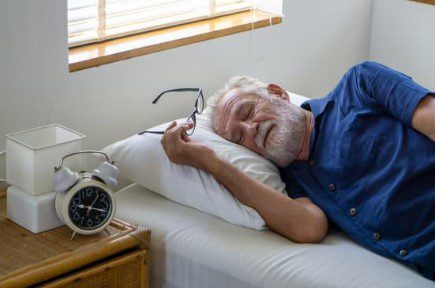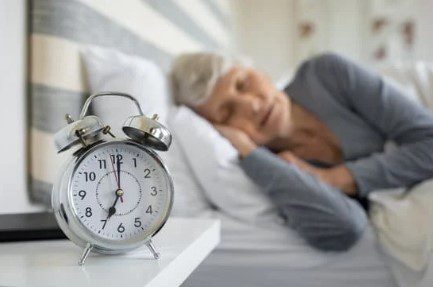Three Reasons Why Aging Affects Our Sleep—and How to Sleep Better as We Age

Have you ever noticed that as you get older, sleep doesn’t come as easily as it once did? Whether it’s struggling to fall asleep, waking up multiple times throughout the night, or feeling groggy in the morning, sleep disturbances seem to increase as we age. This isn’t just a coincidence—there are real biological and lifestyle factors at play.
As we age, many of the processes in our body, including sleep, undergo changes. These changes can make restful, uninterrupted sleep harder to achieve. But understanding why sleep becomes more difficult with age can help us find ways to improve it. Let’s break down the top three reasons why sleep tends to be more elusive as we get older and explore strategies for better sleep.
Decreased Melatonin Production
Melatonin is often referred to as the “sleep hormone” because it helps regulate our internal body clock, signaling when it’s time to sleep and when it’s time to wake up. When it’s dark, the brain produces more melatonin, which helps us feel drowsy. As we age, however, our bodies naturally produce less melatonin. This decrease can disrupt our sleep-wake cycle, making it harder to both fall asleep and stay asleep throughout the night.
Why Does This Happen?
Melatonin production is closely tied to our circadian rhythm, which gradually changes as we get older. Environmental factors, such as reduced exposure to natural sunlight and increased artificial light, can also suppress melatonin production, making the problem even worse.
How Can We Improve It?
Maximize natural light exposure: Try to spend time outside during daylight hours, especially in the morning. This can help regulate your circadian rhythm.
Limit blue light at night: The blue light emitted by phones, computers, and TVs can interfere with melatonin production. Try to reduce screen time an hour or two before bed.
Consider melatonin supplements: If natural methods don’t help, consult your doctor about taking a melatonin supplement. These can be helpful, but it’s important to use them under medical guidance.

Changes in Sleep Architecture
Sleep is not a uniform state. Throughout the night, we go through different stages of sleep, from light sleep to deep, restorative sleep. As we age, there’s a shift in how much time we spend in each stage. Older adults typically experience less deep sleep and more light sleep. This means that even if you’re in bed for eight hours, your sleep may not feel as restorative as it once did.
The Science Behind It
Young adults spend about 20% of their sleep in the deep, slow-wave sleep stages, which are crucial for physical recovery, memory consolidation, and overall well-being. As we get older, that percentage decreases significantly, often dropping to as little as 5%. This makes older adults more prone to waking up frequently throughout the night, especially due to external disturbances like noise or changes in room temperature.
What Can Help?
Create a sleep-friendly environment: A cool, quiet, and dark room can help reduce unnecessary awakenings. Invest in earplugs, blackout curtains, or a white noise machine if needed.
Practice relaxation techniques: Deep breathing, progressive muscle relaxation, and mindfulness exercises can help calm your body and mind, making it easier to fall back into a deeper sleep.
Stick to a sleep schedule: Going to bed and waking up at the same time every day helps reinforce your body’s internal clock, making it easier to enter deeper stages of sleep consistently.
Health Conditions and Medications
As we age, we’re more likely to experience chronic health conditions that can interfere with sleep. Conditions like arthritis, which causes pain and discomfort, can make it difficult to stay asleep. Sleep apnea, a condition where breathing repeatedly stops and starts during sleep, is also more common in older adults and can severely impact sleep quality. Additionally, the need to use the bathroom more frequently, a condition known as nocturia, can disrupt sleep.
Medications to manage conditions such as high blood pressure, heart disease, or mental health issues can also affect sleep. Some medications may cause drowsiness, while others may cause restlessness or frequent awakenings.
Common Health Issues That Affect Sleep:
Arthritis and chronic pain: Persistent pain makes it hard to fall asleep or stay asleep. Adjusting sleeping positions or using special pillows may provide relief.
Sleep apnea: This condition, characterized by loud snoring and frequent awakenings, often requires medical intervention such as a CPAP machine to keep airways open.
Nocturia: Managing fluid intake in the evening and consulting with a doctor can help address frequent nighttime urination.
Managing Sleep Disruptions Due to Health and Medications
Consult with your healthcare provider: If your medications are affecting your sleep, talk to your doctor about adjusting dosages or switching to alternatives with fewer side effects.
Treat underlying conditions: Whether it’s arthritis, sleep apnea, or another health issue, getting treatment for the root cause of your sleep disruptions can significantly improve your sleep quality.
Steps to Improve Sleep as You Age
It’s clear that sleep challenges come with aging, but that doesn’t mean we’re doomed to restless nights forever. Here are a few key strategies to promote better sleep:
Maintain a consistent routine: Go to bed and wake up at the same time every day, even on weekends.
Limit naps: While a short nap can be refreshing, long naps or napping too late in the day can make it harder to fall asleep at night.
Watch what you eat and drink: Avoid large meals, caffeine, and alcohol before bedtime. All of these can disrupt your ability to fall or stay asleep.
Stay active: Regular physical activity can help you fall asleep faster and enjoy deeper sleep. Just be mindful not to exercise too close to bedtime, as it can leave you feeling too energized to sleep.
Manage stress: Engage in relaxation techniques such as yoga, meditation, or deep breathing before bed to reduce anxiety and promote relaxation.
It’s Never Too Late to Improve Your Sleep
Although aging brings challenges to our sleep patterns, it’s important to recognize that many of these issues can be managed with lifestyle adjustments and medical support. Prioritizing sleep is essential for your physical, emotional, and cognitive health—no matter your age.
If you or a loved one is experiencing sleep difficulties, take the time to identify the factors that may be contributing. Whether it’s adjusting your environment, seeking treatment for a health condition, or making changes to your bedtime routine, improving sleep is always within reach. Remember, a good night’s rest is one of the most valuable investments in your overall well-being, and it’s never too late to start.
